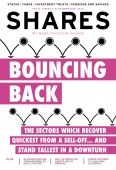Archived article
Please note that tax, investment, pension and ISA rules can change and the information and any views contained in this article may now be inaccurate.
Discover where fund firms are looking for growth

It is always good to have an insight into market sentiment as, in the short-term, it can impact how different assests and sectors perform.
Sometimes it can be useful to take a cue from investment fund companies, who often launch new funds when they think a particular area of investing will do well.
For instance, with Brexit uncertainty, trade wars that have threatened to go global and economic growth stagnant in virtually all developed market economies, not many fund firms are rushing to launch traditional UK, European or US equity funds.
Data from the Investment Association for August (the
latest available at time of publication) shows that funds in all three of the major asset classes – equities, bonds, and property – suffered net outflows, i.e. more money was taken out by investors than money being put in.
Equities and bond funds lost £1.6bn and £968m respectively, while property lost £91m.
Instead of blue chip stocks in developed countries, fund firms are looking to asset classes like private equity, investing in shares of companies which are not listed on a stock exchange.
‘INCREASINGLY RELEVANT ASSET CLASS’
Schroders description of private equity as an ‘increasingly relevant asset class’ when it launched its Schroder GAIA II Specialist Private Equity fund earlier this month was pretty telling about where investors see opportunities.
Data from the Association of Investment Companies (AIC) shows that over the past decade, private equity investment companies have generated returns for investors averaging 300%, more than double the 125% gain from the FTSE All Share over the same period.
While it is often too complicated (and risky) for ordinary investors to invest in private companies on their own, there are some investment trusts and now a rising number of funds available to help people access this area of investing.
One such fund is the aforementioned Schroders one, which the firm’s head of private equity, Rainer Ender, said will ‘give a greater pool of investors’ access to an asset class which has ‘traditionally been out of reach of the vast majority of investors apart from big institutions’.
Although in this instance, it’s important to note its key investor information document (KIID) states the fund is intended for sophisticated retail and institutional investors.
Meanwhile, a number of fund firms are still interested in emerging markets, looking to take advantage of specific themes in certain regions.
French fund giant Amundi for example has launched a New Silk Road fund, aiming for long-term capital growth from it what said will be the ‘expected expansion in trade’ and ‘associated economic growth’ from China’s Belt and Road Initiative (BRI), a project which effectively intends to create a new silk road.
This particular fund is only available to professional investors for now.
In addition, ethical and climate change funds continue to be popular, especially the latter as it becomes more established in the minds of the public and therefore companies too, generating new opportunities to make money while also being seen to ‘do the right thing’.
Aviva Investors has launched a Climate Transition European Equity fund, which will invest in companies that make money from goods and services addressing climate change mitigation and adaptation, and will also focus on firms aligning their business models with a warmer, low-carbon world.
Here are two others funds, available to retail investors in the UK, which give an idea of where the investment world is looking for growth.
Vanguard Active UK Equity (BK1XRK6)
Going against the grain when it comes to recent fund launches is Vanguard, which is usually known for its exchange-traded funds (ETFs).
This active mutual fund is similar to other active UK-focused funds in that it aims to pick a selection of UK-listed companies that are set up for growth.
Sub-advised by active managers Baillie Gifford and Marathon Asset Management, it tries to identify UK firms with growth potential which will benefit from the flow of investments in and out of UK industries.
Unlike a lot of other active funds however, it has a lower than normal fee for an active fund with an ongoing charges figure of 0.45% a year.
Somerset EM Discovery (BK5SP70)
Following the trend of fund managers looking to emerging markets for growth, this fund from Somerset Capital Management aims to find pockets of growth from companies unloved by the wider market.
Skewed towards EMEA (Europe, Middle East and Africa) and Latin America, the fund targets small and mid-caps with a market cap of between $1bn and $7.5bn, run by emerging markets small cap expert Mark Asquith.
For the first six months of its launch, the fund is waiving its annual management charge to investors, meaning people who put money in now won’t have to start paying 0.75% per annum fee until 1 May 2020.
It’s worth pointing out though that this fund is significantly higher up the risk spectrum, as emerging markets – particularly throughout EMEA and Latin America – face more political and economic challenges, and therefore more volatility.
Important information:
These articles are provided by Shares magazine which is published by AJ Bell Media, a part of AJ Bell. Shares is not written by AJ Bell.
Shares is provided for your general information and use and is not a personal recommendation to invest. It is not intended to be relied upon by you in making or not making any investment decisions. The investments referred to in these articles will not be suitable for all investors. If in doubt please seek appropriate independent financial advice.
Investors acting on the information in these articles do so at their own risk and AJ Bell Media and its staff do not accept liability for losses suffered by investors as a result of their investment decisions.

 magazine
magazine










